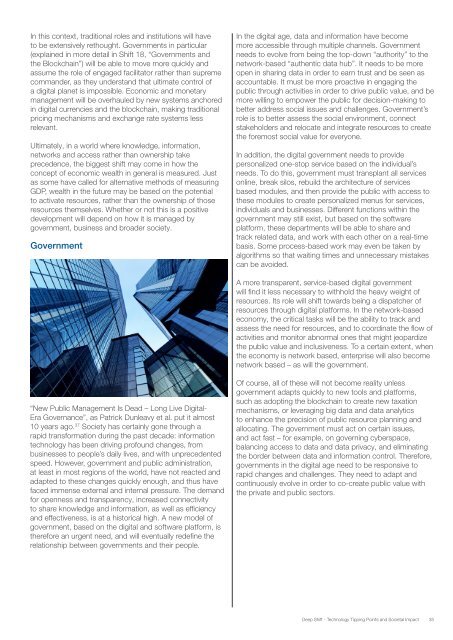Deep Shift Technology Tipping Points and Societal Impact
WEF_GAC15_Technological_Tipping_Points_report_2015
WEF_GAC15_Technological_Tipping_Points_report_2015
- No tags were found...
Create successful ePaper yourself
Turn your PDF publications into a flip-book with our unique Google optimized e-Paper software.
In this context, traditional roles <strong>and</strong> institutions will have<br />
to be extensively rethought. Governments in particular<br />
(explained in more detail in <strong>Shift</strong> 18, “Governments <strong>and</strong><br />
the Blockchain”) will be able to move more quickly <strong>and</strong><br />
assume the role of engaged facilitator rather than supreme<br />
comm<strong>and</strong>er, as they underst<strong>and</strong> that ultimate control of<br />
a digital planet is impossible. Economic <strong>and</strong> monetary<br />
management will be overhauled by new systems anchored<br />
in digital currencies <strong>and</strong> the blockchain, making traditional<br />
pricing mechanisms <strong>and</strong> exchange rate systems less<br />
relevant.<br />
Ultimately, in a world where knowledge, information,<br />
networks <strong>and</strong> access rather than ownership take<br />
precedence, the biggest shift may come in how the<br />
concept of economic wealth in general is measured. Just<br />
as some have called for alternative methods of measuring<br />
GDP, wealth in the future may be based on the potential<br />
to activate resources, rather than the ownership of those<br />
resources themselves. Whether or not this is a positive<br />
development will depend on how it is managed by<br />
government, business <strong>and</strong> broader society.<br />
Government<br />
In the digital age, data <strong>and</strong> information have become<br />
more accessible through multiple channels. Government<br />
needs to evolve from being the top-down “authority” to the<br />
network-based “authentic data hub”. It needs to be more<br />
open in sharing data in order to earn trust <strong>and</strong> be seen as<br />
accountable. It must be more proactive in engaging the<br />
public through activities in order to drive public value, <strong>and</strong> be<br />
more willing to empower the public for decision-making to<br />
better address social issues <strong>and</strong> challenges. Government’s<br />
role is to better assess the social environment, connect<br />
stakeholders <strong>and</strong> relocate <strong>and</strong> integrate resources to create<br />
the foremost social value for everyone.<br />
In addition, the digital government needs to provide<br />
personalized one-stop service based on the individual’s<br />
needs. To do this, government must transplant all services<br />
online, break silos, rebuild the architecture of services<br />
based modules, <strong>and</strong> then provide the public with access to<br />
these modules to create personalized menus for services,<br />
individuals <strong>and</strong> businesses. Different functions within the<br />
government may still exist, but based on the software<br />
platform, these departments will be able to share <strong>and</strong><br />
track related data, <strong>and</strong> work with each other on a real-time<br />
basis. Some process-based work may even be taken by<br />
algorithms so that waiting times <strong>and</strong> unnecessary mistakes<br />
can be avoided.<br />
A more transparent, service-based digital government<br />
will find it less necessary to withhold the heavy weight of<br />
resources. Its role will shift towards being a dispatcher of<br />
resources through digital platforms. In the network-based<br />
economy, the critical tasks will be the ability to track <strong>and</strong><br />
assess the need for resources, <strong>and</strong> to coordinate the flow of<br />
activities <strong>and</strong> monitor abnormal ones that might jeopardize<br />
the public value <strong>and</strong> inclusiveness. To a certain extent, when<br />
the economy is network based, enterprise will also become<br />
network based – as will the government.<br />
“New Public Management Is Dead – Long Live Digital-<br />
Era Governance”, as Patrick Dunleavy et al. put it almost<br />
10 years ago. 37 Society has certainly gone through a<br />
rapid transformation during the past decade: information<br />
technology has been driving profound changes, from<br />
businesses to people’s daily lives, <strong>and</strong> with unprecedented<br />
speed. However, government <strong>and</strong> public administration,<br />
at least in most regions of the world, have not reacted <strong>and</strong><br />
adapted to these changes quickly enough, <strong>and</strong> thus have<br />
faced immense external <strong>and</strong> internal pressure. The dem<strong>and</strong><br />
for openness <strong>and</strong> transparency, increased connectivity<br />
to share knowledge <strong>and</strong> information, as well as efficiency<br />
<strong>and</strong> effectiveness, is at a historical high. A new model of<br />
government, based on the digital <strong>and</strong> software platform, is<br />
therefore an urgent need, <strong>and</strong> will eventually redefine the<br />
relationship between governments <strong>and</strong> their people.<br />
Of course, all of these will not become reality unless<br />
government adapts quickly to new tools <strong>and</strong> platforms,<br />
such as adopting the blockchain to create new taxation<br />
mechanisms, or leveraging big data <strong>and</strong> data analytics<br />
to enhance the precision of public resource planning <strong>and</strong><br />
allocating. The government must act on certain issues,<br />
<strong>and</strong> act fast – for example, on governing cyberspace,<br />
balancing access to data <strong>and</strong> data privacy, <strong>and</strong> eliminating<br />
the border between data <strong>and</strong> information control. Therefore,<br />
governments in the digital age need to be responsive to<br />
rapid changes <strong>and</strong> challenges. They need to adapt <strong>and</strong><br />
continuously evolve in order to co-create public value with<br />
the private <strong>and</strong> public sectors.<br />
<strong>Deep</strong> <strong>Shift</strong> - <strong>Technology</strong> <strong>Tipping</strong> <strong>Points</strong> <strong>and</strong> <strong>Societal</strong> <strong>Impact</strong><br />
35











